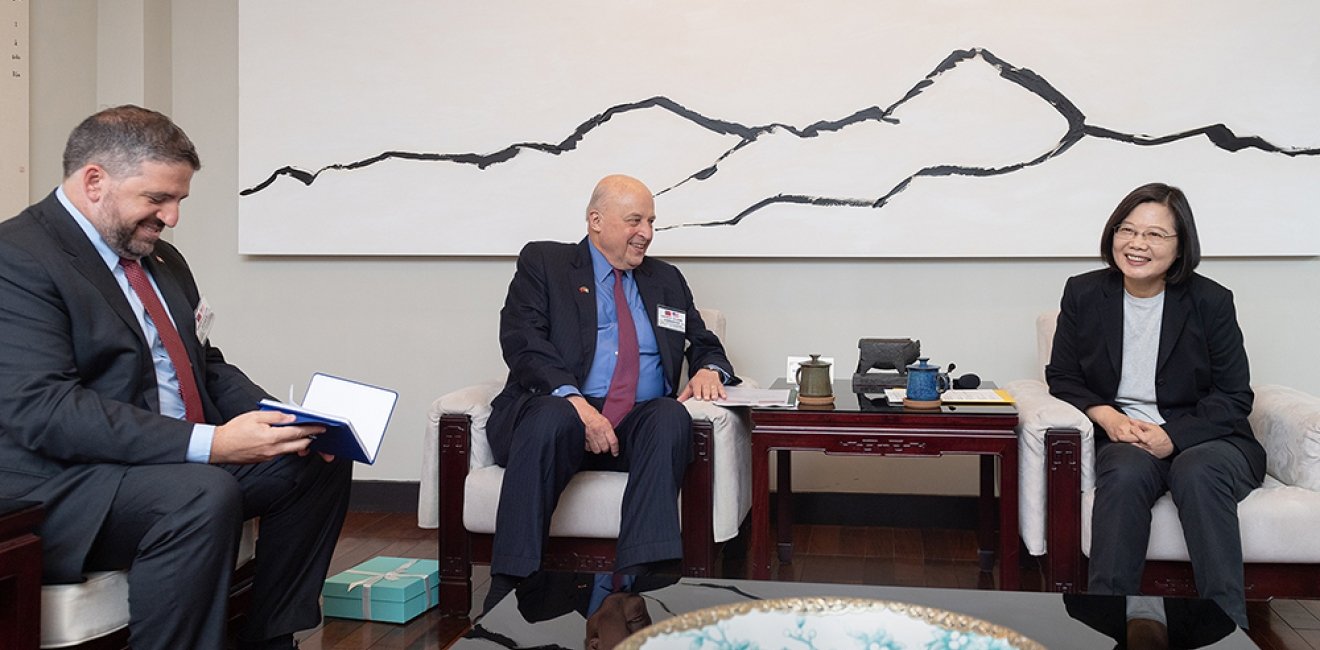
A blog of the Indo-Pacific Program
It has been a busy week for China. In addition to holding a major military parade in Beijing to commemorate the 70th anniversary of the founding of the People’s Republic of China, Chinese security forces dramatically escalated tension in Hong Kong by using live ammunition against protesters. During this remarkable week I was in Taiwan as a guest of their foreign ministry, meeting with leaders from their government, military, academia, and business communities. The week’s events had a significant impact on Taiwan, and are likely to reverberate for years to come.
China’s military parade was a shot across the bow of Taiwan, and the latest in a series of efforts by Beijing to increase pressure on Taipei. According to the Pentagon, China’s military identifies Taiwan as its main “strategic direction” and is focused on preparing to deter and compel Taiwan to abandon moves toward independence, using force to unify Taiwan with the mainland, and deterring or denying the United States from intervening on Taiwan’s behalf. This parade follows a series of Chinese military exercises in which fighter jets crossed the median line in the Taiwan Strait and encircled the island that Beijing described as “a strong warning to Taiwan independence separatist forces and their activities.”
Nearly simultaneously, China’s violent crackdown of protests in Hong Kong sent a stark warning to Taiwan. China envisions relations with both Hong Kong and Taiwan to be guided by slightly different versions of the principle of “one country two systems,” in which both could theoretically continue to enjoy democratic systems of government while recognizing that they are part of the People’s Republic of China. The problem for Beijing is that the violent crackdown against protesters in Hong Kong, and the extradition law to which they object, makes clear the lie at the heart of “one country two systems.” Democracy can never thrive under the rule of a one-Party state, and many people in Taiwan see Hong Kong as a stark warning. As a result, both the ruling and opposition parties in Taiwan have firmly rejected “one country two systems.”
The primary danger for Taipei today is what may come if Xi were to decide that China’s current strategy toward Taiwan has failed.
The primary danger for Taipei today is what may come if Xi were to decide that China’s current strategy toward Taiwan has failed. Eight years of economic and political engagement between China and Taiwan under President Ma Ying-jeou did not bring the island closer to the mainland’s embrace. Efforts by Beijing to punish Taiwan for electing current President Tsai Ing-wen, which have included de facto economic sanctions and rapidly shrinking Taiwan’s diplomatic space, have failed to translate into a political realignment in Taiwan toward Beijing’s favor. If Xi determines that China’s strategy has indeed failed, the potential for Beijing to use force may escalate.
Taiwan is in a difficult strategic position. It cannot sacrifice its democracy or its security, and it cannot hope to match the military threat from the mainland alone. As Taiwan prepares for presidential elections in January 2020, its people will be making an incredibly consequential decision about their future. President Tsai and her challenger, Kaohsiung Mayor Han Kuo-yu (both of whom I met with during the past week) have different views on what this future may be and how to orient toward the mainland.
There is certainly a lot that Washington could and should do to help Taiwan, but it must also be cautious.
These dynamics will also be deeply consequential for the United States. If tensions between Beijing and Taipei continue to escalate, Washington will likely feel pulled into greater levels of support for Taiwan – an instinct that would have significant implications for relations between China and the United States. There is certainly a lot that Washington could and should do to help Taiwan, but it must also be cautious. As I have written previously, symbolic acts of support have little practical value but can have an effect of generating a harsh response from Beijing that, ultimately, harms Taiwan’s interests. On the other hand, pragmatic initiatives, such as defense cooperation and arms sales that enhance Taiwan’s ability to defend itself and potential trade and investment agreements, can go a long way toward actually supporting Taiwan’s security and prosperity.
Taiwan issues have been largely dormant in the geopolitics of the Indo-Pacific in recent years. Yet troubling trends in the cross-Strait relationship, and concerning developments inside China itself, suggest that this issue will not remain calm for much longer. It would be wise for Washington to adhere the principles and policies that have kept the peace across the Taiwan Strait for the past four decades, and that enabled Taiwan to emerge as the robust economic power and rigorous democracy it is today.
Image: Flickr / Official Photo from the Office of the President, Taiwan
Follow Abraham Denmark, director of the Asia Program, on Twitter @AbeDenmark.
The views expressed are the author's alone, and do not represent the views of the U.S. Government or the Wilson Center. Copyright 2019, Asia Program. All rights reserved.
Author


Indo-Pacific Program
The Indo-Pacific Program promotes policy debate and intellectual discussions on US interests in the Asia-Pacific as well as political, economic, security, and social issues relating to the world’s most populous and economically dynamic region. Read more





